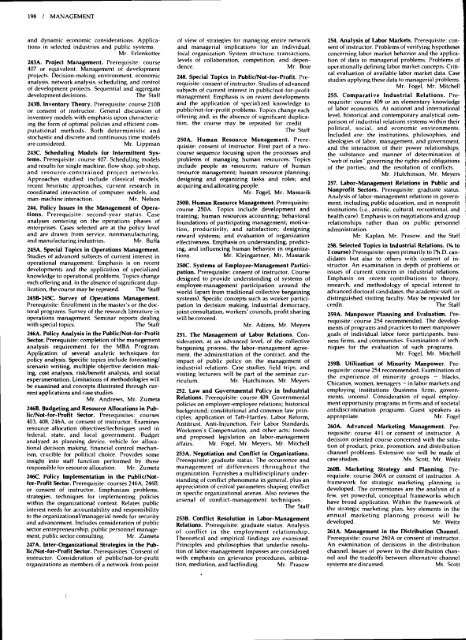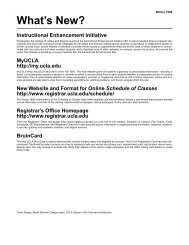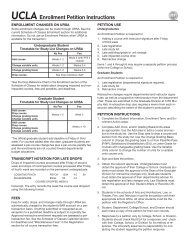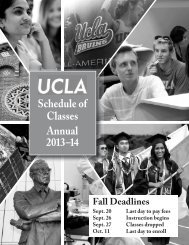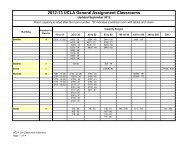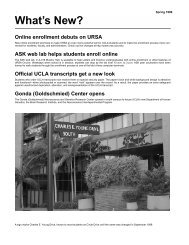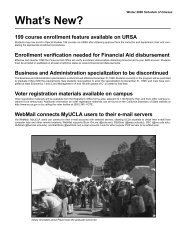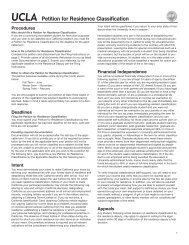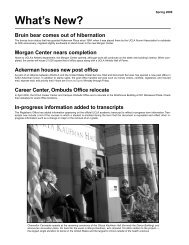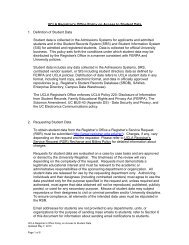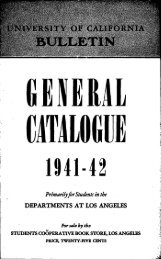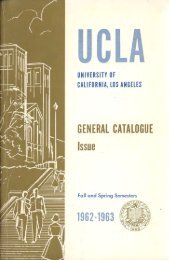UCLA Graduate Catalog 1980-81 - Registrar - UCLA
UCLA Graduate Catalog 1980-81 - Registrar - UCLA
UCLA Graduate Catalog 1980-81 - Registrar - UCLA
Create successful ePaper yourself
Turn your PDF publications into a flip-book with our unique Google optimized e-Paper software.
198 1 MANAGEMENT<br />
and dynamic economic considerations. Applications<br />
in selected industries and public systems.<br />
Mr. Erlenkotter<br />
243A. Project Management . Prerequisite: course<br />
407 or equivalent. Management of development<br />
projects. Decision-making environment, economic<br />
analysis, network analysis, scheduling, and control<br />
of development projects. Sequential and aggregate<br />
development decisions. The Staff<br />
243B. Inventory Theory. Prerequisite: course 210B<br />
or consent of instructor. General discussion of<br />
inventory models with emphasis upon characterizing<br />
the form of optimal policies and efficient computational<br />
methods. Both deterministic and<br />
stochastic and discrete and continuous time models<br />
are considered. Mr. Lippman<br />
243C. Scheduling Models for Intermittent Systems<br />
. Prerequisite: course 407. Scheduling models<br />
and results for single machine, flow shop, job shop,<br />
and resource-constrained project networks.<br />
Approaches studied include classical models,<br />
recent heuristic approaches, current research in<br />
coordinated interaction of computer models, and<br />
man-machine interaction. Mr. Nelson<br />
244. Policy Issues in the Management of Operations.<br />
Prerequisite: second-year status. Case<br />
analyses centering on the operations phases of<br />
enterprises. Cases selected are at the policy level<br />
and are drawn from service, nonmanufacturing,<br />
and manufacturing industries. Mr. Buffa<br />
245A. Special Topics in Operations Management.<br />
Studies of advanced subjects of current interest in<br />
operational management. Emphasis is on recent<br />
developments and the application of specialized<br />
knowledge to operational problems. Topics change<br />
each offering and, in the absence of significant duplication,<br />
the course may be repeated. The Staff<br />
245B-245C. Survey of Operations Management.<br />
Prerequisite: Enrollment in the master's or the doctoral<br />
programs. Survey of the research literature in<br />
operations management. Seminar reports dealing<br />
with special topics. The Staff<br />
246A. Policy Analysis in the Pubtic /Not- for- Profit<br />
Sector. Prerequisite : completion of the management<br />
analysis requirement for the MBA Program.<br />
Application of several analytic techniques for<br />
policy analysis . Specific topics include forecasting/<br />
scenario writing , multiple objective decision making,<br />
cost analysis , risk /benefit analysis , and social<br />
experimentation . Limitations of methodologies will<br />
be examined and concepts illustrated through current<br />
applications and case studies.<br />
Mr. Andrews, Mr. Zumeta<br />
246B. Budgeting and Resource Allocations in Public/Not<br />
-for-Profit Sector. Prerequisites: courses<br />
403, 408, 246A, or consent of instructor. Examines<br />
resource allocation objectives/techniques used in<br />
federal, state, and local government. Budget<br />
analyzed as planning device, vehicle for allocational<br />
decision making, financial control mechanism,<br />
crucible for political choice. Provides some<br />
insight into staff function performed by those<br />
responsible for resource allocation. Mr. Zumeta<br />
246C. Policy Implementation in the Public/Notfor-Profit<br />
Sector. Prerequisite: courses 246A, 246B,<br />
or consent of instructor. Emphasizes problems,<br />
strategies, techniques for implementing policies<br />
within the organizational context. Relates public<br />
interest needs for accountability and responsibility<br />
to the organizational/managerial needs for security<br />
and advancement. Includes consideration of public<br />
sector entrepreneurship, public personnel management,<br />
public sector consulting. Mr. Zumeta<br />
247A. Inter-Organizational Strategies in the Public/Not<br />
-for-Profit Sector. Prerequisites: Consent of<br />
instructor. Consideration of public/not-for-profit<br />
organizations as members of a network from point<br />
of view of strategies for managing entire network<br />
and managerial implications for an individual,<br />
focal organization. System structure, transactions,<br />
levels of collaboration, competition, and dependence.<br />
Mr. Boje<br />
248. Special Topics in Public /Not-for -Profit. Prerequisite:<br />
consent of instructor. Studies of advanced<br />
subjects of current interest in public/not-for-profit<br />
management. Emphasis is on recent developments<br />
and the application of specialized knowledge to<br />
public/not-for-profit problems. Topics change each<br />
offering and, in the absence of significant duplication,<br />
the course may be repeated for credit.<br />
The Staff<br />
250A . Human Resource Management . Prerequisite<br />
: consent of instructor . First part of a twocourse<br />
sequence focusing upon the processes and<br />
problems of managing human resources. Topics<br />
include people as resources ; nature of human<br />
resource management ; human resource planning;<br />
designing and organizing tasks and roles; and<br />
acquiring and allocating people.<br />
Mr. Fogel , Mr. Massarik<br />
250B . Human Resource Management . Prerequisite:<br />
course 250A. Topics include development and<br />
training ; human resources accounting ; behavioral<br />
foundations of participating management ; motivation<br />
, productivity, and satisfaction ; designing<br />
reward systems ; and evaluation of organization<br />
effectiveness . Emphasis on understanding , predicting,<br />
and influencing human behavior in organizations<br />
. Mr. Kleingartner , Mr. Massarik<br />
250C. Systems of Employee -Management Participation.<br />
Prerequisite : consent of instructor . Course<br />
designed to provide understanding of systems of<br />
employee-management participation around the<br />
world (apart from traditional collective bargaining<br />
systems). Specific concepts such as worker participation<br />
in decision making, industrial democracy,<br />
joint consultation , workers' councils , profit sharing<br />
will be covered.<br />
Mr. Adizes, Mr. Meyers<br />
251. The Management of Labor Relations. Consideration,<br />
at an advanced level, of the collective<br />
bargaining process, the labor-management agreement,<br />
the administration of the contract, and the<br />
impact of public policy on the management of<br />
industrial relations. Case studies, field trips, and<br />
visiting lecturers will be part of the seminar curriculum.<br />
Mr. Hutchinson, Mr. Meyers<br />
252. Law and Governmental Policy in Industrial<br />
Relations. Prerequisite: course 409. Governmental<br />
policies on employer-employee relations; historical<br />
background; constitutional and common law principles;<br />
application of Taft-Hartley, Labor Reform,<br />
Antitrust, Anti-Injunction, Fair Labor Standards,<br />
Workmen's Compensation, and other acts; trends<br />
and proposed legislation on labor-management<br />
affairs. Mr. Fogel, Mr. Meyers, Mr. Mitchell<br />
253A. Negotiation and Conflict in Organizations.<br />
Prerequisite: graduate status. The occurrence and<br />
management of differences throughout the<br />
organization. Furnishes a multidisciplinary understanding<br />
of conflict phenomena in general, plus an<br />
appreciation of critical parameters shaping conflict<br />
in specific organizational arenas. Also reviews the<br />
arsenal of conflict-management techniques.<br />
The Staff<br />
253B . Conflict Resolution in Labor - Management<br />
Relations. Prerequisite: graduate status. Analysis<br />
of conflict in the employment relationship.<br />
Theoretical and empirical findings are examined.<br />
Principles and philosophies that underlie resolution<br />
of labor-management impasses are considered<br />
with emphasis on grievance procedures, arbitration,<br />
mediation, and factfinding. Mr. Prasow<br />
254. Analysis of Labor Markets. Prerequisite: consent<br />
of instructor. Problems of verifying hypotheses<br />
concerning labor market behavior and the application<br />
of data to managerial problems. Problems of<br />
operationally defining labor market concepts. Critical<br />
evaluation of available labor market data. Case<br />
studies applying these data to managerial problems.<br />
Mr. Fogel, Mr. Mitchell<br />
255. Comparative Industrial Relations. Prerequisite:<br />
course 409 or an elementary knowledge<br />
of labor economics. At national and international<br />
level, historical and contemporary analytical comparison<br />
of industrial relations systems within their<br />
political, social, and economic environments.<br />
Included are: the institutions, philosophies, and<br />
ideologies of labor, management, and government,<br />
and the interaction of their power relationships;<br />
the substance and manner of determination of<br />
"web of rules" governing the rights and obligations<br />
of the parties; and the resolution of conflicts.<br />
Mr. Hutchinson, Mr. Meyers<br />
257. Labor -Management Relations in Public and<br />
Nonprofit Sectors. Prerequisite: graduate status.<br />
Analysis of labor-management relations in government,<br />
including public education, and in nonprofit<br />
institutions (i.e., artistic, cultural, recreational, and<br />
health care). Emphasis is on negotiations and group<br />
relationships<br />
administration.<br />
rather than on public personnel<br />
Mr. Kaplan, Mr. Prasow, and the Staff<br />
258. Selected Topics in Industrial Relations. (Yi to<br />
1 course ) Prerequisite: open primarily to Ph.D. candidates<br />
but also to others with consent of instructor.<br />
An examination in depth of problems or<br />
issues of current concern in industrial relations.<br />
Emphasis on recent contributions to theory,<br />
research, and methodology of special interest to<br />
advanced doctoral candidates, the academic staff, or<br />
distinguished visiting faculty. May be repeated for<br />
credit. The Staff<br />
259A. Manpower Planning and Evaluation. Prerequisite:<br />
course 254 recommended. The developments<br />
of programs and practices to meet manpower<br />
goals of individual labor force participants, business<br />
firms, and communities. Examination of techniques<br />
for the evaluation of such programs.<br />
Mr. Fogel, Mr. Mitchell<br />
259B. Utilization of Minority Manpower. Prerequisite:<br />
course 254 recommended. Examination of<br />
the experience of minority groups - blacks,<br />
Chicanos, women, teenagers - in labor markets and<br />
employing institutions (business firms, governments,<br />
unions). Consideration of equal employment<br />
opportunity programs in firms and of societal<br />
antidiscrimination programs. Guest speakers as<br />
appropriate. Mr. Fogel<br />
260A. Advanced Marketing Management. Prerequisite:<br />
course 411 or consent of instructor. A<br />
decision oriented course concerned with the solution<br />
of product, price, promotion, and distribution<br />
channel problems. Extensive use will be made of<br />
case studies. Ms. Scott, Mr. Weitz<br />
2608 . Marketing Strategy and Planning. Prerequisite:<br />
course 260A or consent of instructor. A<br />
framework for strategic marketing planning is<br />
developed. The cornerstones are the analysis of a<br />
few, yet powerful, conceptual frameworks which<br />
have broad application. Within the framework of<br />
the strategic marketing plan, key elements in the<br />
annual marketing planning process will be<br />
developed. Mr. Weitz<br />
261A. Management in the Distribution Channel.<br />
Prerequisite: course 260A or consent of instructor.<br />
An examination of decisions in the distribution<br />
channel. Issues of power in the distribution channel<br />
and the tradeoffs between alternative channel<br />
systems are discussed. Ms. Scott


